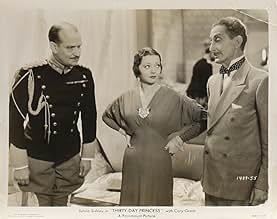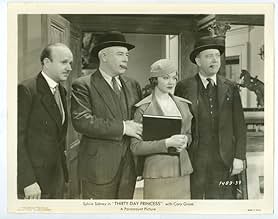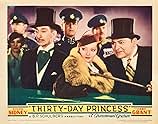VALUTAZIONE IMDb
6,7/10
1308
LA TUA VALUTAZIONE
Aggiungi una trama nella tua linguaA European princess arrives in New York City to secure a much-needed loan for her country. She contracts the mumps, and an actress who looks exactly like her is hired to impersonate her.A European princess arrives in New York City to secure a much-needed loan for her country. She contracts the mumps, and an actress who looks exactly like her is hired to impersonate her.A European princess arrives in New York City to secure a much-needed loan for her country. She contracts the mumps, and an actress who looks exactly like her is hired to impersonate her.
- Regia
- Sceneggiatura
- Star
William Arnold
- City Editor
- (non citato nei titoli originali)
William Augustin
- Detective #2
- (non citato nei titoli originali)
Allan Cavan
- Court Officer
- (non citato nei titoli originali)
Jean Chatburn
- Blonde
- (non citato nei titoli originali)
Oliver Cross
- Court Officer
- (non citato nei titoli originali)
Edgar Dearing
- Tim - Policeman at Mrs. Schmidt's
- (non citato nei titoli originali)
Sayre Dearing
- Ceremonial Guest
- (non citato nei titoli originali)
Recensioni in evidenza
I've always loved Sylvia Sidney. I started going to the movies the year her last leading lady performance (LOVE FROM A STRANGER) was made, but I didn't see it then and it was only in revivals in the 1950s and occasional showings of some of her 1930s films on TV that I discovered her. I was amazed at how good she was even when only 21 or 22 years of age, and I thought she was just about the prettiest actress in the world at the time. Problem is, time didn't treat that prettiness too well, and when you saw her after the age of, say, 45 or so, it was hard to see even a trace of that prettiness. No problem, though, for she was a great actress and, I think with proper allowances in casting, she might today be one of the true legends of Hollywood's 1930s era. Well, we'll just have to settle for talent. I'm writing this, though, to say that one is never too old to learn. Although Sidney could be hilariously tough and ballsy in her later years, I had not known she had ever made even one comedy in her starring Hollywood years. And now, after 70-plus years of rather intense movie watching, I have finally seen THIRTY DAY PRINCESS, with a performance by her that is all charm and fun and light and prettiness personified. I can't imagine anyone, not even Colbert or Lombard or Stanwyck, could have done it any better. Truly, I have had her so associated with tragedy and poverty and murder and all the other good things of Hollywood Melodramatic Life, that I kept expecting someone to stab her or toss her down a flight of stairs, but nobody ever did. So, I learned that Sylvia could do comedy at a time when just about nobody would let her, and I am a better-informed movie-lover for it today. As for the film itself, she and Cary Grant and Edward Arnold give it exactly what it needs, and it should be far better known today than it is. She was a wonderful actress and, lest I forget to say it one more time, so damned pretty - not beautiful, just so damned pretty.
"Thirty Day Princess" can easily fit into the oeuvre of master comedy writer Preston Sturges although this film predates his 1940 directorial debut by six years. The basic comic premise of one woman impersonating two very different people on opposite ends of the social scale (while convincing the man she's romantically involved with that they are different people) is difficult material to bring off. Within that context Sturges inserts his unique satiric sensibilities on sex and social mores.
Sylvia Sydney, like Barbara Stanwyck seven years later in Sturges' wildly successful "The Lady Eve," succeeds admirably in using accent and mannerisms to distinguish the two characters. Additionall, both talented actresses have the chameleon-like ability to actually look different in both roles without resorting to any major make-up changes. Unfortunately, Cary Grant, at this stage of his career, had not as yet developed his screen persona to a degree that he could capture as much of the Sturges zaniness that Henry Fonda did in the 1941 film.
While Sidney is portraying two completely different people in "Thirty Day Princes," the audience in "The Lady Eve" knows that Barbara Stanwyck's character is essentially playing two different facets of her own personality. so the similarities in her two roles are dramatically plausible. Although it is highly improbable that Sidney's characters, Nancy Lane and Princess Catterina, could look so much alike under ordinary circumstances, Sturges inserts a sly bit of covert sexual innuendo at the film's climax with a subtle dialogue exchange between Nancy and King Anatole suggesting that she possibly is the King's illegitimate daughter, illegitimately sired during a previous trip to America. Sturges was a master at getting questionable material like this discreetly past the censors of his day.
Stealing the show, however, is character actor Vince Barnett, usually assigned to play low level gangsters and bumbling waiters, as Catterina's obnoxiously infantile fiancé, Prince Nicholeus. He delivers a hilarious performance, alternating accents from Mittel-English Ruritanian to Brooklynese. Considering Sturgis' loyalty to eccentric character actors during his heyday at Paramount, it seems unusual that he would not have written additional roles for Barnett in his series of screwball comedies in the early 40's as Barnett did occasionally turn up in Paramount films like Bob Hope's 1942 MY FAVORITE BLONDE.
Sylvia Sydney, like Barbara Stanwyck seven years later in Sturges' wildly successful "The Lady Eve," succeeds admirably in using accent and mannerisms to distinguish the two characters. Additionall, both talented actresses have the chameleon-like ability to actually look different in both roles without resorting to any major make-up changes. Unfortunately, Cary Grant, at this stage of his career, had not as yet developed his screen persona to a degree that he could capture as much of the Sturges zaniness that Henry Fonda did in the 1941 film.
While Sidney is portraying two completely different people in "Thirty Day Princes," the audience in "The Lady Eve" knows that Barbara Stanwyck's character is essentially playing two different facets of her own personality. so the similarities in her two roles are dramatically plausible. Although it is highly improbable that Sidney's characters, Nancy Lane and Princess Catterina, could look so much alike under ordinary circumstances, Sturges inserts a sly bit of covert sexual innuendo at the film's climax with a subtle dialogue exchange between Nancy and King Anatole suggesting that she possibly is the King's illegitimate daughter, illegitimately sired during a previous trip to America. Sturges was a master at getting questionable material like this discreetly past the censors of his day.
Stealing the show, however, is character actor Vince Barnett, usually assigned to play low level gangsters and bumbling waiters, as Catterina's obnoxiously infantile fiancé, Prince Nicholeus. He delivers a hilarious performance, alternating accents from Mittel-English Ruritanian to Brooklynese. Considering Sturgis' loyalty to eccentric character actors during his heyday at Paramount, it seems unusual that he would not have written additional roles for Barnett in his series of screwball comedies in the early 40's as Barnett did occasionally turn up in Paramount films like Bob Hope's 1942 MY FAVORITE BLONDE.
A thoroughly winning little depression-era romantic comedy, THIRTY DAY PRINCESS manages to turn it's fairly routine storyline into a fresh and engaging picture that entertains throughout it's entire runtime. The plot has the Princess of the imaginary country Taronia (Sylvia Sidney) touring the US as an ambassador for her financially struggling country, with the hope of securing a major loan from the US. Upon arrival, our unfortunate Princess is stricken with the mumps, and is replaced by a look-alike actress (also played by Sidney), who doubles the ill Princess until she filly recovers. Complicating matters, however, is an ambitious news executive (Cary Grant), who is skeptical of the US approving such a large loan and wants to get to know out titular princess first hand.
As evidenced by the summary above, the film's plot was flimsy and formulaic even by the standards of the mid-thirties, but the picture manages to surprise viewers by using such an overly-familiar plot device as a springboard for sharp dialogue and delightful, fully-realized performances. Any film of this nature is almost entirely dependent upon its lead performer, and Sylvia Sidney handles her dual role with utter conviction, truly convincing viewers that she is two completely different characters. There is also an irresistible chemistry between Sidney and the young Cary Grant, who offers flashes of the brilliant actor he would soon become. In the end, the film manages to escape its well-worn premise and emerge as a genuine delight as one of the more underrated comedies of the thirties.
As evidenced by the summary above, the film's plot was flimsy and formulaic even by the standards of the mid-thirties, but the picture manages to surprise viewers by using such an overly-familiar plot device as a springboard for sharp dialogue and delightful, fully-realized performances. Any film of this nature is almost entirely dependent upon its lead performer, and Sylvia Sidney handles her dual role with utter conviction, truly convincing viewers that she is two completely different characters. There is also an irresistible chemistry between Sidney and the young Cary Grant, who offers flashes of the brilliant actor he would soon become. In the end, the film manages to escape its well-worn premise and emerge as a genuine delight as one of the more underrated comedies of the thirties.
I liked this movie far more than expected - it's a quite funny mistaken identity kind of film - with the requisite newspapermen, wealthy men, princesses, romance that any Depression era comedy relish. I had some concern about the always serious Sylvia Sidney in a comedy - but her intelligence is just wonderful in the line readings - she's quite an actress.
Cary Grant is very young - and not quite as deft and light as in later years - but fine, not clunky at all.
Edward Arnold is thoroughly enjoyable in the kind of role he was born to play - the plutocrat. I particularly enjoyed the amusing discussion (hard to imagine in a film now) with the king of the necessary size for the bond issue for Taronia's electrification.
There is further interest in the comedy's deadly serious background of extreme poverty/destitution/fear of hunger that haunts the film - it's very much there in the asides, in the protagonist's motivation.
I hadn't realized that Sylvia Sidney (known as a real symbol of the Great Depression) and Cary Grant had worked together twice before. They work very well - and she's far prettier than I remembered.
You'll enjoy this one - the writing (by Sturges and others) is truly sparkling, the comedy is fast, intelligent and the show charming.
Cary Grant is very young - and not quite as deft and light as in later years - but fine, not clunky at all.
Edward Arnold is thoroughly enjoyable in the kind of role he was born to play - the plutocrat. I particularly enjoyed the amusing discussion (hard to imagine in a film now) with the king of the necessary size for the bond issue for Taronia's electrification.
There is further interest in the comedy's deadly serious background of extreme poverty/destitution/fear of hunger that haunts the film - it's very much there in the asides, in the protagonist's motivation.
I hadn't realized that Sylvia Sidney (known as a real symbol of the Great Depression) and Cary Grant had worked together twice before. They work very well - and she's far prettier than I remembered.
You'll enjoy this one - the writing (by Sturges and others) is truly sparkling, the comedy is fast, intelligent and the show charming.
This film has two things that the people of 1934 sorely needed: a feel good love story, and cary grant! With sylvia sidney (got above the title billing), eddie arnold and henry stephenson. When king anatol wants to improve the living conditions for his people, he works out a deal with gresham, the banker. But when the princess is too sick to travel, gresham finds a look-a-like to take her place. And of course, the actress falls for madison. Complications, misunderstsandings, as the old friends of the actress think they have figured things out. Can they keep the secret until the princess goes back to her own country? And can they ever explain things to madison? It's a fun adventure, as an ordinary girl gets to be princess for thirty days. Directed by marion gering. Sidney, grant, and gering had made "madam butterfly" together, just prior to this. It's always interesting to see a screenplay by preston sturges, story by clarence kelland. It's fun to watch, as plain jane gets to be princess for a short time.
Lo sapevi?
- QuizIt is Sylvia Sidney's only comedy in a movie where she is the leading actress.
- Citazioni
Porter Madison III: How many reporters are working here?
City Editor: About a quarter of 'em.
- ConnessioniFeatured in The Automat (2021)
I più visti
Accedi per valutare e creare un elenco di titoli salvati per ottenere consigli personalizzati
- How long is Thirty Day Princess?Powered by Alexa
Dettagli
- Data di uscita
- Paese di origine
- Lingua
- Celebre anche come
- Trideset dana princeza
- Luoghi delle riprese
- Aziende produttrici
- Vedi altri crediti dell’azienda su IMDbPro
- Tempo di esecuzione1 ora 14 minuti
- Colore
- Proporzioni
- 1.37 : 1
Contribuisci a questa pagina
Suggerisci una modifica o aggiungi i contenuti mancanti

Divario superiore
By what name was Thirty Day Princess (1934) officially released in India in English?
Rispondi


































